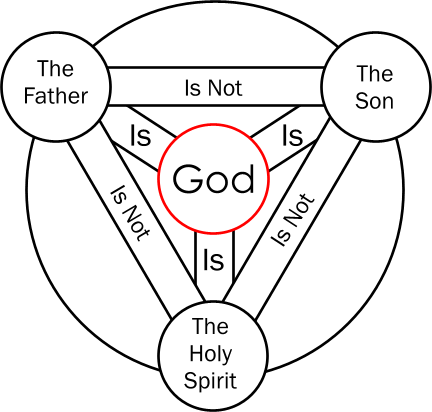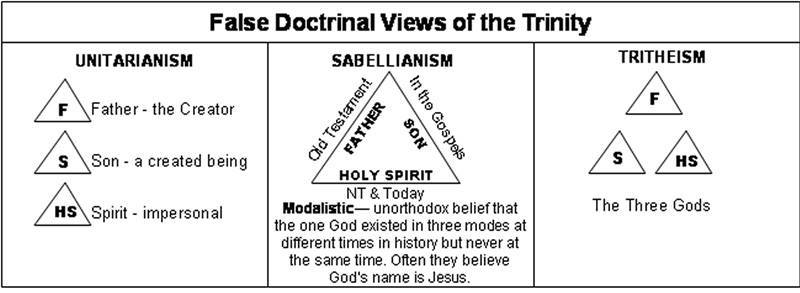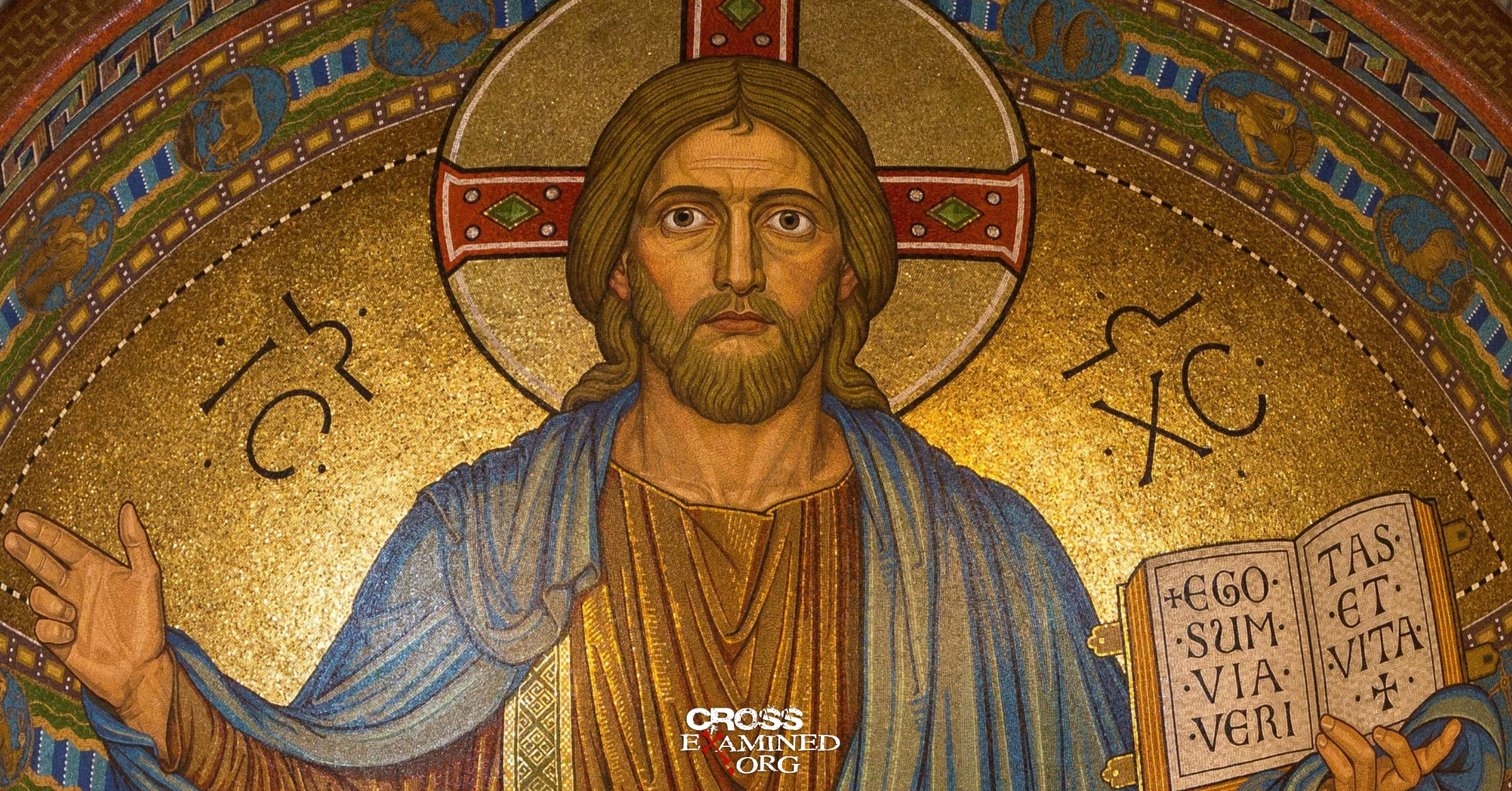By Marcia Montenegro
The Trinity may be a rather neglected doctrine in the church today, even seen as secondary by many. In this article, we’ll consider some of the responses from Christians and non-Christians objecting to the importance of the necessary doctrine of the Trinity and evaluate them.
Non-Trinitarians may seem to be Christian, especially in their avowal for a love for Jesus, but if the Trinity issue is raised, they will usually denounce it as a non-issue, pagan, evil, a man-made doctrine, not a Bible teaching, etc. All non-Trinitarians deny the personhood of the Holy Spirit.
The main question is this: If the Trinity is not true, then where does that leave Jesus?
There are many Christian scholars who have written books on this topic – both on the Trinity and on anti-trinitarian views, giving responses. I have resources listed at the end for those who want to read further.
Objections to the Trinity and Responses
Objection: “Well, nobody really understands the Trinity, so if people don’t adhere to it it’s okay.”
It is true that no one fully understands the Trinity because we are dealing with God’s’ nature. Since God is not created, we as created beings cannot fully grasp the full nature of God. However, he has revealed his attributes in his word, and we can know a lot of things about God.
Since God is uncreated, the Trinity has no counterpart on earth. That is why there is no analogy for it. Most analogies fit modalism (God taking on the roles of three Persons) or tri-theism (three Persons rather than a unity of one), and quickly break down when examined. I do not use an analogy. I say that God is three co-eternal co-equal Persons who are one substance. “Persons,” by the way, does not mean a human person but is the accepted way to describe the three in the Trinity.
Other ways to describe the Trinity:
- There is one and only one God.
- God eternally exists in three distinct persons.
- The Father is God, the Son is God, and the Holy Spirit is God.
- The Father is not the Son; the Son is not the Father, the Father is not the Spirit, etc.[1]
Objection: “As long as they believe in Jesus, that’s all that matters.”
But who is the Jesus they are believing in?
There are two main heresies on the Trinity:
- Oneness or Modalism (sometimes called Sabellianism, named after the 3rd century heretic Sabellius) teaches that God is one person (a Unitarian view of God) who manifests as the Father, Son, and Holy Spirit; and/or one God who has 3 roles or “workings” as Father, Son, and Holy Spirit
- Arianism (named after the 3rd/4th-century heretic Arius) teaches that Jesus is a created being and is lesser than God.
The modalist view includes:
- Jesus is God the Father
- Jesus is the “flesh” of God
- The Holy Spirit is part of God/Jesus
- The Father is the “divine nature,” and Jesus is “the human nature” of God
In contrast, the Bible unequivocally gives this information:
- Jesus is the Son of God, distinct from the Father; Jesus cannot be the Son of God if he is also God the Father
- Jesus spoke of his Father in many passages
- Jesus prayed to the Father
- Throughout the Gospel of John, Jesus talks about how God sent him (Jesus) to earth
- The Holy Spirit is given the same attributes of deity as God[2]

Illustration of The Trinity
The Holy Spirit is given personal traits and spoken of as a Person, not as a mere force, power, or energy.[3]
Some Oneness followers will say that when Jesus prayed to God in heaven, it was the human nature praying to the divine nature. But natures don’t pray, individuals pray. Also, it would be deceptive on God’s part to make it appear as though Jesus is praying to someone else when, in fact, he is not.
The Arian Jesus of the non-Trinity, Jehovah’s Witnesses, Mormons, Christadelphians, the Way, and other cults, is a created being. He has a beginning and is not equal to the Father. This is clearly a false Jesus and is easier to refute than the modalist/Oneness Jesus, which is arguably more deceptive and more difficult to refute.

Arius (250-336) taught that Jesus was a created, finite being, and he was declared a heretic by the Council of Nicea in 325. So it is not the true Jesus if it is a Modalist/Oneness Jesus or the Arian Jesus, and therefore, belief in such a Jesus is fruitless.
Objection: “We aren’t saved by perfect doctrine.”
No, we are not saved by doctrine but by faith, but that faith must be an informed faith. If our doctrine about who Jesus or God is is wrong, then we don’t have faith in the right Jesus. We can have minor things wrong, but not about who Jesus is, because then we have a wrong Jesus, making him non-salvific.
Doctrine merely means “teaching.” The teachings about who God and Jesus are must be true and based on God’s revelation in Scripture. Otherwise, it’s a counterfeit God or Jesus. This is really quite basic. This objection is a straw man.
Just because the word “Jesus” is used by Oneness followers or by Arians does not mean it is the right Jesus. Pay attention to statements of faith because Oneness statements of faith can be quite tricky in their deception. They may say they believe in the “Triune God” without meaning the biblical Trinity.
Modalists can affirm the Apostles’ Creed without belief in the Trinity. They read their own meaning into who Jesus is. An example is the Statement of Beliefs on the website of Dan Dean’s Oneness church (Phillips, Craig & Dean). It gives the Apostles’ Creed as their beliefs, along with other statements. There is no affirmation of the Trinity and no statement clarifying the personhood of the Holy Spirit (because they are a Oneness church[4]).
Who is Jesus if the Trinity is Not True
If there is no Trinity, where does that leave Jesus? Here are the choices:
- He is a lower god
- He is another god
- He is not really the Son of God but is God the Father
- He is just a man and has no deity
These points clearly answer the question, “If the Trinity is not true, then where does that leave Jesus?” It leaves Jesus as a false Jesus. This should establish why the Trinity is an essential of the faith and cannot be denied by anyone who calls him/herself a Christian. It is good to point these out to someone who says the doctrine of the Trinity is not essential or primary.
Well-Known Anti-Trinitarians
There are many well-known people who were/are Anti-Trinitarians, dead and alive; below each name is a link or two exposing their anti-Trinitarian beliefs.
- William Branham (Modalism), a hugely influential figure on erroneous and cultic movements in the church today; there are Branham teachings and followers around the world [5][6]
- D. Jakes, Modalism [7][8]
- Phillips, Craig, & Dean (Modalism) [9][10] [11]
- Roy Masters, Arianism [12][13]
- Ron Dart, similar to Arianism, still heard on Christian radio [14][15]
- The Armstrong cults (Worldwide Church of God), polytheism (the Father and Jesus separate gods) [16] [17][18] [19]
- The Way (formerly The Way International), Arianism [20][21]
A Few Verses on the Trinity (there are many more)
“And when Jesus was baptized, immediately he went up from the water, and behold, the heavens were opened to him, and he saw the Spirit of God descending like a dove and coming to rest on him; and behold, a voice from heaven said, “This is my beloved Son, with whom I am well pleased.” Matthew 3:16, 17
“Therefore having been exalted to the right hand of God, and having received from the Father the promise of the Holy Spirit, He [Jesus] has poured forth this which you both see and hear.” Acts 2:33
“You know of Jesus of Nazareth, how God anointed Him with the Holy Spirit and with power, and how He went about doing good and healing all who were oppressed by the devil, for God was with Him.” (Acts. 10:38)
“But the Helper, the Holy Spirit, whom the Father will send in My [Jesus’] name, He will teach you all things, and bring to your remembrance all that I said to you.” (John 14:26)
“When the Helper comes, whom I [Jesus] will send to you from the Father, that is the Spirit of truth who proceeds from the Father, He will testify about Me…” (John 15:26)
“How much more will the blood of Christ, who through the eternal Spirit offered Himself without blemish to God, cleanse your conscience from dead works to serve the living God?” (Hebrews 9:14)
“The grace of the Lord Jesus Christ, and the love of God, and the fellowship of the Holy Spirit, be with you all. The grace of the Lord Jesus Christ, and the love of God, and the fellowship of the Holy Spirit, be with you all.” (2 Corinthians 13:14)
Additional Resources on the Trinity
(Selected list, not exhaustive)
- Arianism [22]
- Modalism [23]
- Oneness Pentecostalism [24]
- What are Sabellianism, Modalism, and Monarchism [25]
- The Athanasian Creed confessing the Trinity [26]
- CANA post, Modalism is an Attack on God [27]
- Why the Trinity Is An Essential Doctrine [28]
- Jesus Christ Our Creator, A Biblical Defence of the Trinity [29]
- Oneness Pentecostalism from NAMB (North American Mission Board of the SBC) [30]
- Oneness Pentecostalism and the Trinity [31]
- The Biblical Basis for the Doctrine of the Trinity [32]
- Faith Groups that Reject the Trinity [33]
Books on the Trinity
- A Definitive Look at Oneness Theology: In the Light of Biblical Trinitarianism by Edward Dalcour
- Oneness Pentecostals and the Trinity by Gregory Boyd
- Jesus Only Churches by E. Calvin Beisner
- Why You Should Believe in the Trinity: An Answer to Jehovah’s Witnesses by Robert Bowman
References
[1] Theopedia, https://www.theopedia.com/trinity
[2] The Trinity, CARM
[3] See numbers 3 and 4 on https://carm.org/verses-showing-identity-ministry-and-personhood-holy-spirit
[4] http://theheartlandchurch.com/beliefs/
[5] https://www.watchman.org/profiles/pdf/branhamismprofile.pdf
[6] http://www.apologeticsindex.org/5870-william-branham
[7] http://www.equip.org/article/concerns-about-the-teachings-of-t-d-jakes/
[8] CANA article on T. D. Jakes’ slippery language on the Trinity http://www.solasisters.com/2012/01/td-jakes-through-glass-blurrily.html
[9] http://hereiblog.com/modalism-revisted-phillips-craig-dean/
[10] https://www.aomin.org/aoblog/2013/01/05/blurring-the-dividing-linethe-legacy-of-phillipscraig-and-dean/
[11] https://rootedinchrist.org/2008/01/01/phillips-craig-dean-and-the-united-pentecostal-church-upci-oneness-pentecostals/
[12] Walter Martin exposes Masters’ heretical beliefs in a debate with Masters https://soundcloud.com/steven-j-aronfeld/roy-masters-debates-walter
[13] CANA post on Masters, https://www.facebook.com/FormerNewAger/posts/10153497822822237
[14] http://www.soundwitness.org/evangel/ronald_dart_anti-trinitarian.htm
[15] http://watchmansbagpipes.blogspot.com/2015/07/heresy-alert.html
[16] https://www.watchman.org/profiles/pdf/armstrongismprofile.pdf
[17] https://www.gotquestions.org/Worldwide-Church-God-Armstrongism.html
[18] https://www.gotquestions.org/Worldwide-Church-God-Armstrongism.html
[19] https://www.watchman.org/articles/cults-alternative-religions/history-of-armstrongism/
[20] https://www.watchman.org/profiles/pdf/wayprofile.pdf
[21] https://carm.org/way-international
[22] Theopedia goo.gl/HjnvyY
[23] Theopedia goo.gl/ATjpBY
[24] goo.gl/SwZtUU
[25] Got Questions (4 articles) goo.gl/dsANZ6
[26] goo.gl/5m5Axy
[27] goo.gl/GtFbKZ
[28] J. Warner Wallace, http://bit.ly/1L8KRAT
[29] Jonathan Safarti, goo.gl/jXebGb
[30] goo.gl/ug2AQL
[31] Robert Bowman, Jr. goo.gl/5QWmtn
[32] Robert Bowman, Jr., goo.gl/ehfzUU
[33] goo.gl/nRECCC
Original Blog Source: http://bit.ly/2rJ1frd











